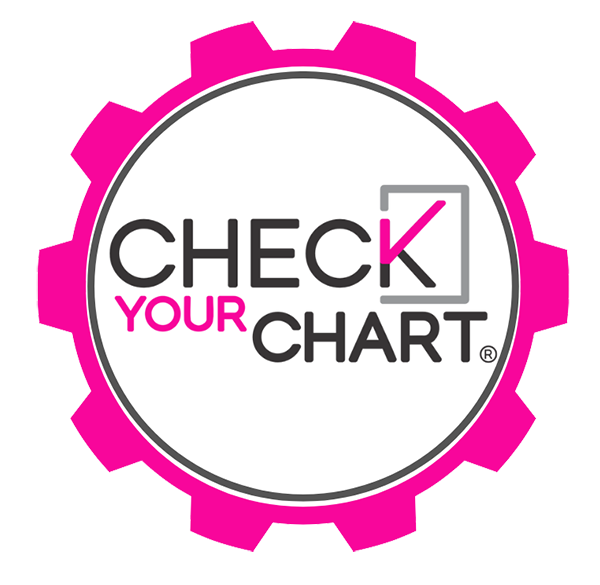MY TOOLS
Navigating the process can be a challenge.
These resources will help!
Check Your ChartTM
Join the Check Your ChartTM movement!
The best way to find out your breast density is to Check Your Chart after you get a mammogram. Learn the key words and phrases to look for in your mammogram report.
Once you know your density, learn how to take appropriate action to maximize the chances of finding your breast cancer early when the chances of survival are greatest, and treatment is easiest.

Insurance / Self-Pay
Insurance does not always cover a screening. Most places offer a “Self-Pay” option at a lower price. To avoid any financial surprises, be sure to ask what the Self-Pay Price is before having any procedure done.
Tips . . .
- It’s good practice to always ask a provider, “What is the price if you process through insurance, and what is the self-pay price?” Sometimes the self pay price may be less than your deductible!
- Know your insurance service codes so you can verify the right procedure was processed through insurance. Ask your doctor’s office for the insurance code they will use for the test in question.
- Be sure your doctor states the procedure “is medically necessary.” When they say that, insurance is more likely to cover. You may have to insist on this, as not all doctors are aware. Additionally, insurance may be more likely to pay if your doctor uses a risk assessment model to determine supplemental screening. Inquire about risk models with your doctor.

Roadblocks To Supplemental Screening for Women with Dense Breasts
Contributing factors that prevent supplemental screening for women with dense breasts:
- Varying Opinions: Medical organizations recommend different things regarding supplemental screening, leaving women and doctors frustrated and confused.
- Common Misconceptions: For example – that a 3D mammogram (also called DBT or tomosynthesis) completely solves the issue with breast density. It does not.
- General Confusion: Many GP and OBGYNs are not current and are confused about the various guidelines issued by different medical organizations.
Guide for common responses to roadblocks
when advocating for additional breast cancer screening.
Roadblock Comment: It’s not considered standard of care for women with dense breasts to automatically get additional screening.
Your Possible Response: Multiple studies show that adding supplemental screening techniques to mammography can find many more cancers in women with dense breasts. I would like to go above and beyond the standard of care to make sure any cancer is found early. Ultrasound finds 2-3 more cancers per thousand women with dense breasts, and Molecular Breast Imaging (MBI), Magnetic Resonance Imaging (MRI), or Contrast Enhanced Spectral Mammography (CESM) find more than that.[21]
Roadblock Comment: You don’t have major breast cancer risk factors.
Your Possible Response: Simply having breast density is a significant risk factor for breast cancer. A woman with extremely dense breasts is 4-6 more times likely to develop breast cand than a woman with little to no breast density.[22]
Roadblock Comment: You don’t have a family history of breast cancer.
Your Possible Response: Most women diagnosed with breast cancer don’t have a family history of the disease. About 15 percent of women diagnosed with breast cancer have a first-degree female relative (mother, sister or daughter) who’s also had it. [24]
Roadblock Comment: There are many unnecessary biopsies as a result of additional imaging.
Your Possible Response: This can be true. However, women do not die of false positives, but a false negative (not finding the cancer until it is too late) can be deadly. I want to know my options. The earlier breast cancer is found, the higher the chance of survival.[25]
Roadblock Comment: You aren’t at a 20% or higher lifetime risk, so you don’t qualify.
Your Possible Response: Does your risk model include density? If not, it should. What do you recommend beyond mammograms for those of us with dense breasts? Additionally, many women who develop breast cancer are not particularly at higher risk.
What To Say / Sample Scripts
What to say when talking to doctors:
Potential questions and conversation starters. Be sure to ask, learn, insist, and persist until you are satisfied with the outcome of your conversation.
- Let’s read my mammography report together.
- What is my density level? What does that mean to you?
- What is my BI-RADS rating? What does that mean to you?
See more about BI-RADS here: https://www.cancer.org/cancer/breast-cancer/screening-tests-and-early-detection/mammograms/understanding-your-mammogram-report.html - How confident are you that this test has found any cancer that may be present?
- Do you recommend supplemental screening for breast cancer, especially if I have dense breasts?
- If so, let’s go over the options. (See Options Page)
- If not, why not? (See Roadblocks Section)

What to say when talking to insurance companies:
- First – make sure you have the same insurance code that your doctor’s office will use if applicable to the conversation. The doctor’s office should be able to supply you with this code.
- What supplemental breast cancers screening modes do you cover?
– Ultrasound?
– Molecular Breast Imaging?
– Contrast Enhanced Digital (or Spectral) Mammography?
– MRI? - What are the circumstances under which each would be covered?
- What maximizes my chances of getting these modes paid for by insurance? What do you need to see, or know?

Information to share with your friends & family
- Know your breast density. Do you know your breast density? Find out by getting a mammogram and reading your report. The law mandates that a rating of breast density must be in that report. If it is not clear – ask!
- Breast density increases breast cancer risk. 70% of premenopausal women have dense breasts. After age, breast density is the highest risk factor for getting breast cancer (except for women with a genetic predisposition such as BRCA1, BRCA2, etc). A woman with extremely dense breasts is 4-6 times more likely to get breast cancer than a woman who has fatty breasts.[22]
- Mammography will find less than 1/2 of all cancers in dense breast tissue. This includes 3D mammography – also called tomosythnesis or DBT.[2,3,4]
- Most cancers are in dense breast tissue. 71% of all breast cancers occur in women with dense breasts.[22]
- Mammography may not be enough. Therefore in some cases, mammography alone fails those of us who might need it the most. Learn more at www.mydensitymatters.org or google ‘breast density’.
- Supplemental screening. If you have dense breasts, consider supplemental breast cancer screening. Explore the options on www.mydensitymatters.org and talk with your doctor.
- Ask Learn, Insist, and Persist – to get what you think you need and deserve! We cannot yet depend on all doctors to do this for us, so we MUST advocate for ourselves.




 Carmen West is a Senior Global Human Capital & Change Transformation Professional.
Carmen West is a Senior Global Human Capital & Change Transformation Professional.






